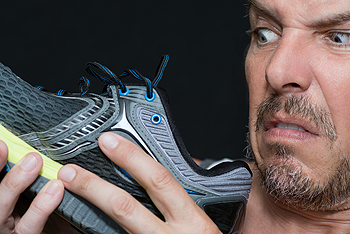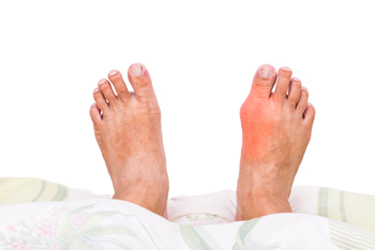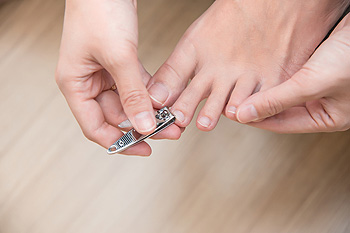October 2019
Foot and Ankle Surgery
When conservative, noninvasive methods prove ineffective, surgery may be selected as the next course of action for the treatment of your foot or ankle condition. A wide number of foot and ankle surgical procedures exist, and it is up to your podiatrist to determine which intervention will be most appropriate and helpful for your case. Some surgical procedures include bunion surgery, fusion, hammertoe surgery, heel spur surgery, metatarsal surgery, nail surgery, neuroma surgery, reconstructive surgery, skin surgery, and tendon surgery. Typically, surgery is turned to as a definitive way to alleviate excessive pain or discomfort and to return your foot to full mobility.
Regardless of the location on the body, all surgical procedures require preoperative testing and examination to ensure the surgery’s success and preferred outcome. A review of your medical history and medical conditions will take place, as will an evaluation of any current diseases, illnesses, allergies, and medications. Tests such as blood studies, urinalyses, EKG, X-rays, and blood flow studies may be ordered. Because the procedure involves the foot and/or ankle, the structures of your feet while walking may also be observed by your podiatrist.
Care post-surgery will depend on the type of surgical procedure performed. Typically, all postoperative care involves rest, ice, compression, and elevation. To improve and ensure a safe recovery, your foot and ankle surgeon may also employ the use of bandages, splints, surgical shoes, casts, crutches, or canes. He will also determine if and when you can bear weight. A timely and thorough recovery is a priority for both you and your podiatrist, and carefully following postoperative instructions can help achieve this.
Why Choose Foot Surgery?
 Many patients choose to have foot surgery performed as an option to relieve severe pain and discomfort. Relief may be found when toenail removal is chosen to correct chronically infected ingrown toenails. Bunion surgery may be a choice to consider if the bunion is painful and unsightly. Research has indicated it is helpful to wear orthotics following a bunionectomy, as this may help to achieve long lasting relief. If pain is felt from a deformed ankle, the surgery that may help diminish the discomfort is referred to as an ankle fusion. Additionally, this type of surgery may help patients who have ankle arthritis, and neuromuscular disorders. If you have foot pain, and are considering surgery, it is strongly advised that you schedule a consultation with a podiatrist who can properly guide you toward making the choice that is correct for you.
Many patients choose to have foot surgery performed as an option to relieve severe pain and discomfort. Relief may be found when toenail removal is chosen to correct chronically infected ingrown toenails. Bunion surgery may be a choice to consider if the bunion is painful and unsightly. Research has indicated it is helpful to wear orthotics following a bunionectomy, as this may help to achieve long lasting relief. If pain is felt from a deformed ankle, the surgery that may help diminish the discomfort is referred to as an ankle fusion. Additionally, this type of surgery may help patients who have ankle arthritis, and neuromuscular disorders. If you have foot pain, and are considering surgery, it is strongly advised that you schedule a consultation with a podiatrist who can properly guide you toward making the choice that is correct for you.
Foot surgery is sometimes necessary to treat a foot ailment. To learn more, contact one of our podiatrists of Ankle & Foot Care Center. Our doctors will assist you with all of your foot and ankle needs.
When Is Surgery Necessary?
Foot and ankle surgery is generally reserved for cases in which less invasive, conservative procedures have failed to alleviate the problem. Some of the cases in which surgery may be necessary include:
- Removing foot deformities like bunions and bone spurs
- Severe arthritis that has caused bone issues
- Cosmetic reconstruction
What Types of Surgery Are There?
The type of surgery you receive will depend on the nature of the problem you have. Some of the possible surgeries include:
- Bunionectomy for painful bunions
- Surgical fusion for realignment of bones
- Neuropathy decompression surgery to treat nerve damage
Benefits of Surgery
Although surgery is usually a last resort, it can provide more complete pain relief compared to non-surgical methods and may allow you to finally resume full activity.
Surgical techniques have also become increasingly sophisticated. Techniques like endoscopic surgery allow for smaller incisions and faster recovery times.
If you have any questions please feel free to contact our office located in Jupiter, FL . We offer the newest diagnostic and treatment technologies for all your foot and ankle needs.
It's Time for Beautiful Feet
Feet That Excessively Sweat
 The medical term that is known as plantar hyperhidrosis is more commonly known as feet that sweat excessively. Patients who have this condition sweat without any exertion, and it may soak through their socks and shoes. Research has indicated it may be caused by overactive sweat glands, and can worsen under stressful situations. Relief may be found if specific medications are taken, and anxiety may be controlled by psychotherapy techniques. If you suffer from this ailment, it is important that you wear shoes and socks that are made of breathable materials, in addition to airing the feet out as frequently as possible. Please consult with a podiatrist if you are afflicted with plantar hyperhidrosis, so you can learn about possible treatment options.
The medical term that is known as plantar hyperhidrosis is more commonly known as feet that sweat excessively. Patients who have this condition sweat without any exertion, and it may soak through their socks and shoes. Research has indicated it may be caused by overactive sweat glands, and can worsen under stressful situations. Relief may be found if specific medications are taken, and anxiety may be controlled by psychotherapy techniques. If you suffer from this ailment, it is important that you wear shoes and socks that are made of breathable materials, in addition to airing the feet out as frequently as possible. Please consult with a podiatrist if you are afflicted with plantar hyperhidrosis, so you can learn about possible treatment options.
If you are suffering from hyperhidrosis contact one of our podiatrists of Ankle & Foot Care Center. Our doctors can provide the care you need to attend to all of your foot and ankle needs.
Hyperhidrosis of the Feet
Hyperhidrosis is a rare disorder that can cause people to have excessive sweating of their feet. This can usually occur all on its own without rigorous activity involved. People who suffer from hyperhidrosis may also experience sweaty palms.
Although it is said that sweating is a healthy process meant to cool down the body temperature and to maintain a proper internal temperature, hyperhidrosis may prove to be a huge hindrance on a person’s everyday life.
Plantar hyperhidrosis is considered to be the main form of hyperhidrosis. Secondary hyperhidrosis can refer to sweating that occurs in areas other than the feet or hands and armpits. Often this may be a sign of it being related to another medical condition such as menopause, hyperthyroidism and even Parkinson’s disease.
In order to alleviate this condition, it is important to see your doctor so that they may prescribe the necessary medications so that you can begin to live a normal life again. If this is left untreated, it is said that it will persist throughout an individual’s life.
A last resort approach would be surgery, but it is best to speak with your doctor to find out what may be the best treatment for you.
If you have any questions please feel free to contact our office located in Jupiter, FL . We offer the newest diagnostic and treatment technologies for all your foot and ankle needs.
Hyperhidrosis of the Feet
Hyperhidrosis of the feet, also termed plantar hyperhidrosis, is characterized by excessive sweating of the feet that can be onset by any cause, such as exercise, fever, or anxiety. Most people suffering from hyperhidrosis of the feet also experience hyperhidrosis of the hands, or palmar hyperhidrosis. Approximately 1-2% of Americans suffer from this disorder.
Sweating is a healthy process utilized by the body in order to cool itself and maintain a proper internal temperature, which is controlled by the sympathetic nervous system. In individuals with hyperhidrosis, the sympathetic nervous system works in "overdrive", producing far more sweat than is actually needed.
Plantar hyperhidrosis is considered primary hyperhidrosis. Secondary hyperhidrosis refers to excessive sweating that occurs in an area other than the feet, hands, or armpits, and this indicates that is related to another medical condition, such as menopause, hyperthyroidism, or Parkinson's disease.
Symptoms of hyperhidrosis of the feet can include foot odor, athlete's foot, infections, and blisters. Because of the continual moisture, shoes and socks can rot which creates an additional foul odor and can ruin the material, requiring shoes and socks to be replaced frequently. In addition to the physical symptoms, emotional health is often affected as this disorder can be very embarrassing.
If left untreated, hyperhidrosis will usually persist throughout an individual's life. However, there are several treatment options available. A common first approach to treating hyperhidrosis of the feet is a topical ointment. Aluminum chloride, an ingredient found in antiperspirants, can be effective at treating hyperhidrosis if used in high concentration and applied to the foot daily. Some individuals can experience relief this way, while others encounter extreme irritation and are unable to use the product. Another procedure is the use of Botulinum Toxin A, commonly referred to as Botox. This is injected directly into the foot, and is effective at minimizing the sweat glands in the injected area. These injections must be repeated every 4 to 9 months.
If these treatments are ineffective, oral prescription medications may be taken in an effort to alleviate the symptoms. Again, some will experience relief while others do not. Going barefoot reportedly provides relief for most sufferers.
A final approach to combating hyperhidrosis of the feet is through surgery. Surgery has been less successful on patients with plantar hyperhidrosis than on those with palmar hyperhidrosis. It is only recommended when sweating is severe and other treatments have failed to work. This kind of surgery usually involves going into the central nervous system, and cutting nerves to stop the transmission of signals telling the foot to sweat.
What Is Gout?
 Research has indicated that gout may be common among men who are over forty years of age. It often causes severe pain and discomfort, and is considered to be a disabling form of arthritis. It can target individuals who are overweight, or people who have medical conditions that can include diabetes and high blood pressure. Additionally, genetics may play a significant role in developing gout. This ailment can occur from having excess uric acid in the blood, and may come from eating foods that have elevated purine levels. This may cause crystals to develop and lodge in the joints of the big toe. These types of foods can include red meat, shellfish, and drinks that are alcoholic or have high sugar levels. There may be lifestyle changes that can be implemented which may help in reducing the risk of developing gout. These can consist of eating healthy foods, and practicing a gentle exercise routine. If you have gout, it is strongly advised that you seek the counsel of a podiatrist who can properly treat this condition.
Research has indicated that gout may be common among men who are over forty years of age. It often causes severe pain and discomfort, and is considered to be a disabling form of arthritis. It can target individuals who are overweight, or people who have medical conditions that can include diabetes and high blood pressure. Additionally, genetics may play a significant role in developing gout. This ailment can occur from having excess uric acid in the blood, and may come from eating foods that have elevated purine levels. This may cause crystals to develop and lodge in the joints of the big toe. These types of foods can include red meat, shellfish, and drinks that are alcoholic or have high sugar levels. There may be lifestyle changes that can be implemented which may help in reducing the risk of developing gout. These can consist of eating healthy foods, and practicing a gentle exercise routine. If you have gout, it is strongly advised that you seek the counsel of a podiatrist who can properly treat this condition.
Gout is a foot condition that requires certain treatment and care. If you are seeking treatment, contact one of our podiatrists from Ankle & Foot Care Center. Our doctors will treat your foot and ankle needs.
What Is Gout?
Gout is a type of arthritis caused by a buildup of uric acid in the bloodstream. It often develops in the foot, especially the big toe area, although it can manifest in other parts of the body as well. Gout can make walking and standing very painful and is especially common in diabetics and the obese.
People typically get gout because of a poor diet. Genetic predisposition is also a factor. The children of parents who have had gout frequently have a chance of developing it themselves.
Gout can easily be identified by redness and inflammation of the big toe and the surrounding areas of the foot. Other symptoms include extreme fatigue, joint pain, and running high fevers. Sometimes corticosteroid drugs can be prescribed to treat gout, but the best way to combat this disease is to get more exercise and eat a better diet.
If you have any questions please feel free to contact our office located in Jupiter, FL . We offer the newest diagnostic and treatment technologies for all your foot and ankle needs.
Read more about Everything You Need to Know About GoutEverything You Need to Know About Gout
Gout, typically found in diabetic patients, is an unusually painful form of arthritis caused by elevated levels of uric acid in the bloodstream. The condition typically strikes the big joint on the big toe. It has also been known to strike the knees, elbows, fingers, ankles and wrists—generally anywhere that has a functioning, moving joint.
The high level of uric acid in a person’s bloodstream creates the condition known as hyperuricema—the main cause of gout. Genetic predisposition occurs in nine out of ten sufferers. The children of parents who suffer gout will have a two in ten chance of developing the condition as well.
This form of arthritis, being particularly painful, is the leftover uric acid crystallizing in the blood stream. The crystallized uric acid then travels to the space between joints where they rub, causing friction when the patient moves. Symptoms include: pain, redness, swelling, and inflammation. Additional side effects may include fatigue and fever, although reports of these effects are very rare. Some patients have reported that pain may intensify when the temperature drops, such as when you sleep.
Most cases of gout are easily diagnosed by a podiatrist’s assessment of the various symptoms. Defined tests can also be performed. A blood test to detect elevated levels of uric acid is often used as well as an x-ray to diagnose visible and chronic gout.
Treatment for gout simply means eliminating symptoms. Non-steroid anti-inflammatory drugs or NSAIDs (Colchicine and other corticosteroid drugs, etc.) will quell the redness, the swelling, and the inflammation. However, managing your diet, lifestyle changes, and using preventative drugs are all helpful toward fully combating the most severe cases.
Those that lead an inactive lifestyle are at a higher risk for gout. Any amount of exercise decreases the probability of repeat encounters with the condition. Reducing your consumption of red meat, sea food, and fructose-sweetened drinks also reduces the likelihood of chronic gout as well.
Ingesting Vitamin C, coffee, and particular dairy products can help with maintaining a healthy lifestyle. There are new drugs out on the market that inhibit the body’s production of uric acid-producing enzymes. However, reducing or eliminating your overall levels of uric acid is the best remedy to ensuring you lead a gout-free life.
Proper Foot Care May Prevent Unwanted Foot Conditions
 The feet are considered to be the foundation of the body. It is important to take care of them in the best way possible. There are daily routines that can be implemented which can help the feet, and positively affect the overall health of the body. These can include washing and drying the feet thoroughly, followed by using a moisturizer. This aids in keeping the skin soft, and may prevent unwanted foot conditions from developing. Additionally, it is beneficial to wear shoes that fit properly. These can consist of choosing shoes that have adequate room for the toes to move freely in, and ensuring the shoes are constructed with breathable materials. It may be helpful to avoid wearing high heels, or to wear them for limited periods of time, which may help to prevent hammertoe and bunions from developing. Research has indicated the importance of trimming the toenails correctly, as this is known to play a significant role in preventing ingrown toenails from developing. If you would like additional information about how to properly take care of your feet, please consult with a podiatrist.
The feet are considered to be the foundation of the body. It is important to take care of them in the best way possible. There are daily routines that can be implemented which can help the feet, and positively affect the overall health of the body. These can include washing and drying the feet thoroughly, followed by using a moisturizer. This aids in keeping the skin soft, and may prevent unwanted foot conditions from developing. Additionally, it is beneficial to wear shoes that fit properly. These can consist of choosing shoes that have adequate room for the toes to move freely in, and ensuring the shoes are constructed with breathable materials. It may be helpful to avoid wearing high heels, or to wear them for limited periods of time, which may help to prevent hammertoe and bunions from developing. Research has indicated the importance of trimming the toenails correctly, as this is known to play a significant role in preventing ingrown toenails from developing. If you would like additional information about how to properly take care of your feet, please consult with a podiatrist.
Everyday foot care is very important to prevent infection and other foot ailments. If you need your feet checked, contact one of our podiatrists from Ankle & Foot Care Center. Our doctors can provide the care you need to keep you pain-free and on your feet.
Everyday Foot Care
Often, people take care of their bodies, face and hair more so than they do for their feet. But the feet are a very important aspect of our bodies, and one that we should pay more attention to. Without our feet, we would not be able to perform most daily tasks.
It is best to check your feet regularly to make sure there are no new bruises or cuts that you may not have noticed before. For dry feet, moisturizer can easily be a remedy and can be applied as often as necessary to the affected areas. Wearing shoes that fit well can also help you maintain good foot health, as well as making it easier to walk and do daily activities without the stress or pain of ill-fitting shoes, high heels, or even flip flops. Wearing clean socks with closed shoes is important to ensure that sweat and bacteria do not accumulate within the shoe. Clean socks help to prevent Athlete’s foot, fungi problems, bad odors, and can absorb sweat.
If you have any questions please feel free to contact our office located in Jupiter, FL . We offer the newest diagnostic and treatment technologies for all your foot and ankle needs.
Every Day Foot Care
Our feet are important in our everyday lives. The problem is that we tend to neglect them. When this becomes a habit, it can cause significant trouble. Ignoring foot problems can mean pain, limited mobility, and expensive doctor's visits. On the other hand, if feet are cared for and looked after regularly, they will perform without pain or complication.
Routine hygiene is the most basic way to care for the feet. Wash and dry them thoroughly daily. Remember to get between the toes and keep the toenails trimmed and short. If the feet feel dry or there are signs of dryness or cracking, use a moisturizer designed for the feet.
When using moisturizer on the feet, try to avoid applying between the toes. If cream or lotion sits too long, they can cause fungal and bacterial growth. When moisturizer is used between the toes, it can also cause the skin to soften too much.
Shoes are also an important aspect of foot care. When one is picking out shoes, make sure they are the correct size. Shoes need to be snug, but not too tight. On the other hand, if shoes are too loose they can cause foot problems as well. It is highly recommended that shopping for new shoes be done later in the day. The reason for this is that the feet will have settled and swelled to their full size by then. To keep your feet at their most healthy, avoid wearing high heels or flip flops too often. Instead, choose shoes that are good for your feet. Good shoes pad the soles of your feet and support the arches and ankles.
Socks should also be worn daily with closed-toe shoes. They may feel hot during the summer months, but they absorb sweat and moisture off the feet. Without socks, the build-up of sweat in a closed-toe shoe can cause fungal problems and athlete's foot.
The best thing to remember in every day foot care is that shoes do make a difference. If you spend a lot of time on your feet, make sure that your shoes show no signs of wear. Shoes should offer ample support for the arches and the overall foot. Additionally, try to make foot cleaning and maintenance a daily habit. If you keep these things in mind, your feet will stay healthy and safe.




